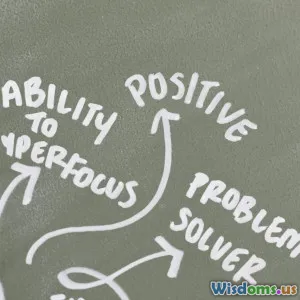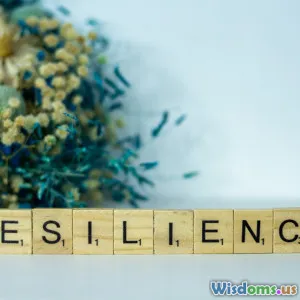
Five Unexpected Benefits of Facing Repeated Failures Early On
8 min read Explore five surprising advantages of early repeated failures that cultivate resilience and success. (0 Reviews)
Five Unexpected Benefits of Facing Repeated Failures Early On
Failure is often perceived as a setback — a sign that we’ve fallen short. But what if those early stumbles aren’t just obstacles but catalysts that shape us into stronger, wiser individuals? Facing repeated failures early in life or career isn’t just about bruised egos or disrupted plans; it’s a formative experience offering deep, lasting benefits that many overlook.
In this article, we will explore five unexpected benefits of encountering failure repeatedly early on, supported by studies, real-world examples, and expert insights. Whether you’re an entrepreneur, student, artist, or athlete, understanding these benefits can transform how you perceive failure and empower you to use it as a stepping stone for unparalleled growth.
1. Resilience: Building Psychological Toughness
One of the most profound benefits from repeated failure is the development of resilience — the psychological capacity to bounce back from adversity.
Research Insights:
According to psychologist Angela Duckworth, author of Grit, perseverance and passion for long-term goals are critical success ingredients. Early failures act like “resilience training,” enhancing an individual's grit.
A longitudinal study published in the Journal of Personality and Social Psychology (2014) showed that individuals who faced moderate levels of challenges and failure during adolescence exhibited stronger coping and emotional regulation skills later in life than their failure-avoidant peers.
Real-world Example:
Consider J.K. Rowling, who faced multiple rejections from publishers before Harry Potter found a home. Each rejection helped her refine her writing and toughened her resolve — she credits these failures with strengthening her storytelling.
Practical Takeaway:
Repeated failures teach us that setbacks are temporary and manageable — fostering emotional strength necessary for future challenges.
2. Enhanced Problem-Solving and Creativity
Failure compels us to evaluate what went wrong, sparking creativity and problem-solving skills crucial for innovation.
Scientific Perspective:
Neuroscientists suggest that confronting failure activates parts of the brain associated with error detection and learning. When setbacks occur repeatedly, the brain adapts by becoming better at recognizing problems and generating solutions.
Domains of Application:
In engineering and software development, iterative failure is foundational. Companies like SpaceX conduct numerous rocket launch experiments, learning from each failure to improve.
Anecdotal Evidence:
Thomas Edison famously remarked on his attempts to invent the light bulb: "I have not failed. I've just found 10,000 ways that won't work." Each failure brought him closer to a solution.
Practical Takeaway:
Failure—and the subsequent analysis—expands cognitive flexibility and innovation, transforming obstacles into learning opportunities.
3. Cultivating Humility and Openness
Repeated setbacks early in life help nurture humility — a crucial factor for continuous learning and collaborative success.
Why Humility Matters:
Research published by Harvard Business School finds that humble leaders are more effective because they acknowledge their limitations and open themselves up to learning from others and mistakes.
Impact on Learning:
People who experience failure are less likely to fall into the trap of complacency or overconfidence. This fosters what psychologists call a growth mindset — the belief that abilities can be developed with effort.
Real-World Illustration:
Entrepreneurs like Sara Blakely, founder of Spanx, attribute their early business failures to making them more receptive to feedback, wiser investments of time and resources, and ultimately, great successes.
Practical Takeaway:
Embracing failure builds intellectual humility, which enhances learning capabilities and interpersonal relationships.
4. Developing a Realistic Perspective on Risk
Facing failure repeatedly from an early stage fosters a more mature and balanced approach to taking risks and handling potential consequences.
Risk Awareness:
Rather than avoiding risk altogether, those who have experienced failure develop sharper intuition about when and how to take calculated risks.
Data Insight:
According to the Global Entrepreneurship Monitor, seasoned entrepreneurs who have failed often start new ventures with more strategic risk assessment and contingency plans, increasing their chances of success.
Example:
Elon Musk endured several early rocket failures with SpaceX and electric car production setbacks at Tesla. These experiences influenced how he manages risks now — with rigorous testing, phased development, and diversification strategies.
Practical Takeaway:
Early failures sharpen our risk assessment abilities, equipping us to make smarter decisions and mitigate potential downsides effectively.
5. Building Empathy and Leadership Abilities
Individuals who have personally grappled with failure tend to develop stronger empathy, an essential ingredient for effective leadership and teamwork.
Leadership Study:
A report by the Center for Creative Leadership highlights how leaders with experiences of failure demonstrate greater emotional intelligence — understanding and connecting with others in meaningful ways.
Relatability:
Having faced struggles, such individuals are better equipped to support, mentor, and inspire others facing challenges, creating more compassionate and cohesive environments.
Corporate Example:
Satya Nadella, CEO of Microsoft, attributes much of his leadership success to early career setbacks, which taught him to listen more deeply and foster a culture of learning and inclusion.
Practical Takeaway:
Failure experiences cultivate empathy, enhancing leadership qualities and the ability to connect and inspire team members.
Conclusion: Embracing Failure as a Fertile Ground for Growth
Far from being an embarrassing dead-end, repeated failures early on are fertile grounds for profound personal and professional growth. They foster resilience, sharpen problem-solving, cultivate humility, refine risk sense, and build empathetic leadership — foundational elements of success in any field.
The stories of resilient individuals and data-driven insights converge on one message:
Failure is not the opposite of success but a vital part of it.
To embrace failure is to embrace learning, and to embrace learning is to unlock your fullest potential. Next time failure knocks, open the door wide and let it in — it may come bearing invaluable lessons and surprising gifts.
References:
- Duckworth, A. (2016). Grit: The Power of Passion and Perseverance.
- Journal of Personality and Social Psychology, 2014 Issue.
- Harvard Business Review on Humble Leadership, 2019.
- Global Entrepreneurship Monitor Reports, 2022.
- Center for Creative Leadership, Emotional Intelligence and Leadership, 2020.
Rate the Post
User Reviews
Popular Posts




















